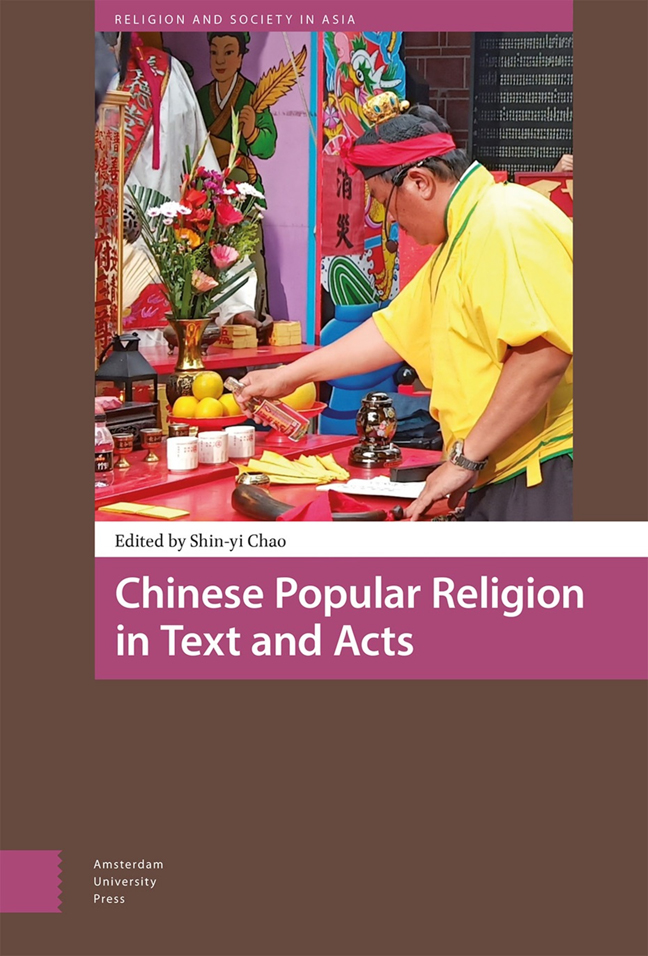Book contents
- Frontmatter
- Contents
- List of Figures and Tables
- Acknowledgements
- Dedication
- Introduction: Text, Acts, and Traditionalization: Performing Chinese Popular Religion
- Section One Texts And Acts
- Section Two Scriptures and Rituals
- Section Three Saints’ Legends and Gods’ Lore
- Section Four Temple Festivals and Pilgrimages
- Index
9 - Our Lady on the Mountain: The Cult of a Daoist Immortal in Village China
Published online by Cambridge University Press: 26 March 2024
- Frontmatter
- Contents
- List of Figures and Tables
- Acknowledgements
- Dedication
- Introduction: Text, Acts, and Traditionalization: Performing Chinese Popular Religion
- Section One Texts And Acts
- Section Two Scriptures and Rituals
- Section Three Saints’ Legends and Gods’ Lore
- Section Four Temple Festivals and Pilgrimages
- Index
Summary
Abstract
Wei Huacun 魏華存 (ca. 252–334) is known as a revered Daoist immortal in early Daoism. What is less known is that she has been worshipped as a tutelary saint in north China. Temple inscriptions at her main temple on Mt. Yangluo (Yangluoshan 陽洛山), Qinyang, Henan Province, testify to the gratitude of local magistrates and villagers for her miraculous reversal of dry spells. Temples in her honor were erected in villages across the county. Villagers collectively made pilgrimages to her main temple on Mt. Yangluo though the early twentieth century. Deploying temple inscriptions and village guidelines for collective pilgrimage, this essay explores the development of Lady Wei in local religion. It demonstrates that texts in popular religion, such as temple inscriptions and ritual guidelines mediated the traditionalization of vernacular beliefs and practices.
Keywords: Wei Huacun, pilgrimage, rain-seeking ritual, goddess, Quanzhen (Complete Perfection) Daoism, temple religion
Rural China remained heavily self-governed well into the twentieth century, and village religion was an important part of this style of governance. The management committee of a village temple often overlapped with the organization administering village affairs. Research on village governance and religion has focused largely on temple fairs, that is, how villagers host events in collaboration. Scholars are aware of the importance of organized pilgrimages in towns and villages. Yet the limited availability of sources beyond modern ethnography makes investigating collective rural pilgrimage in historical times difficult. Gazetteers, for example, tended to adopt a formulaic narrative when describing local religious practices. Early modern popular literature, another important source for studying ordinary people’s religious behavior, offers insights mostly from the prospective of urban dwellers since they were the targeted audience. Furthermore, pilgrims’ stelae on temple grounds were largely destroyed during the second half of the twentieth century, with the only exceptions being top-ranking sites such as Mt. Tai (see chapter 10 by Ye Tao, this volume). This essay, utilizing a manuscript from the turn of the twentieth century discovered at a villager’s home, will shed new light on collective pilgrimage in rural China in Qing times.
The deity at the center of this study, Lady Wei Huacun魏華存 (251–334), is by and large identified as a Daoist “transcendent” (xian 仙), an immortal who transcends the boundary between the human and divine realms.
- Type
- Chapter
- Information
- Chinese Popular Religion in Text and Acts , pp. 211 - 234Publisher: Amsterdam University PressPrint publication year: 2023



